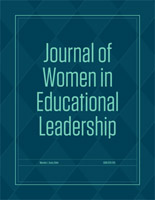Educational Administration, Department of

Journal of Women in Educational Leadership
Date of this Version
4-2007
Document Type
Article
Citation
Journal of Women in Educational Leadership, Vol. 5, No.2-April 2007 ISSN: 1541-6224
Abstract
These are issues that have become prominent in our discussions of educational administration. In travel throughout the United States, the changing face of schools reflects the importance of these issues to education leaders. In two recent trips to educational leadership conferences held in Las Vegas, Nevada, I was struck by the variety of language groups represented by the service workers of the city. My trips in early 2007 were 30 days apart. In that brief time span, it sounded as though the number of languages and accents I heard on the second trip had doubled since the first trip. Disney World has been a regular stop on our family travel agenda since 1974. When the Spring Breakjoumey to the Mouse occurred this year, I was dazzled by the ethnic, linguistic, and cultural diversity in the parks. Disney World has made many changes to welcome and accommodate visitors from around the world. Their success in welcoming international visitors is apparent in who you meet in the parks. It is also apparent who gets to experience Disney World. In the educational administration department at the University of Nebraska- Lincoln, I am involved in an initiative to track the changing face of Nebraska and its schools through demographic data. Although the changes were predicted, the portrait we have created is stunning. In this issue, the manuscripts reflect these pressing social justice issues. "Dorothy Day," as noted by Brock, devoted her life to social justice; and, her life's work lives on in the movement and newspaper she founded. "African American Female College and University Presidents" by Jackson and Harris and "A Voice from Temple University" by Clarke highlight issues of access and race. Reed and Patterson address "Voices of Resilience." Sanger, Deschene, Stokely, and Belau's subjects are adolescent females residing in a correctional facility. Scheklehoff's topic is "Women and Leadership." Brown reviews a book on mentoring which is a key to access. Each of the manuscripts contributes to our understanding of the issues of race, class, access, and equity and provides suggestions for addressing these issues in our work as education leaders.


Comments
Copyright © 2007 Pro>Active Publications. Used by permission.